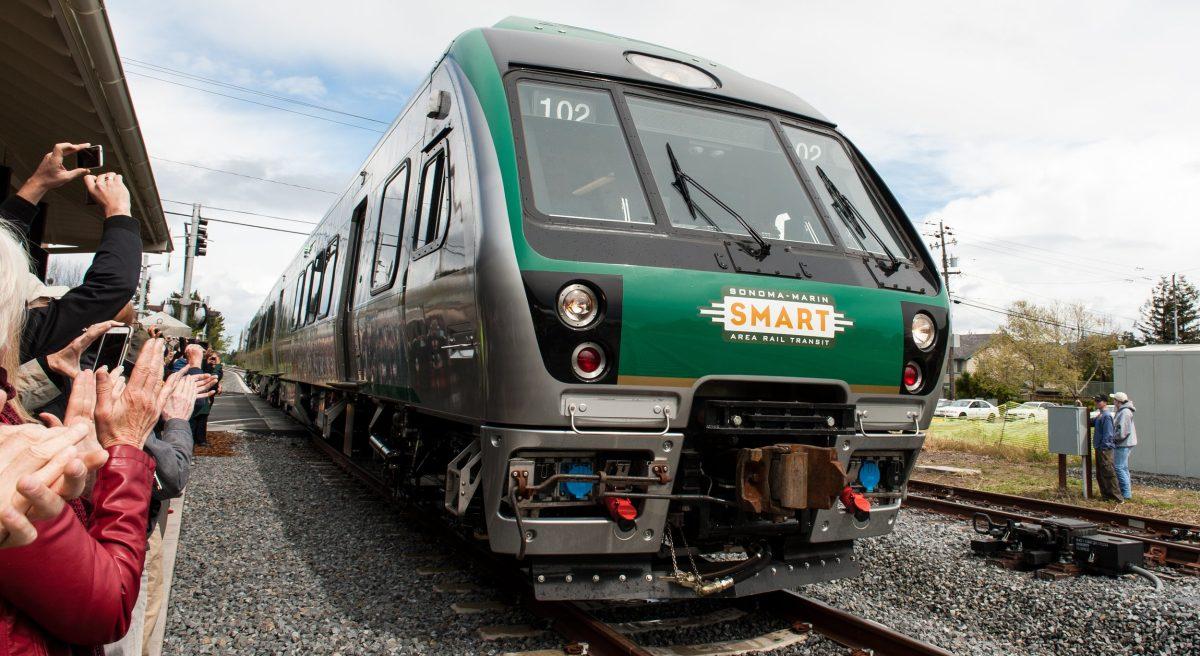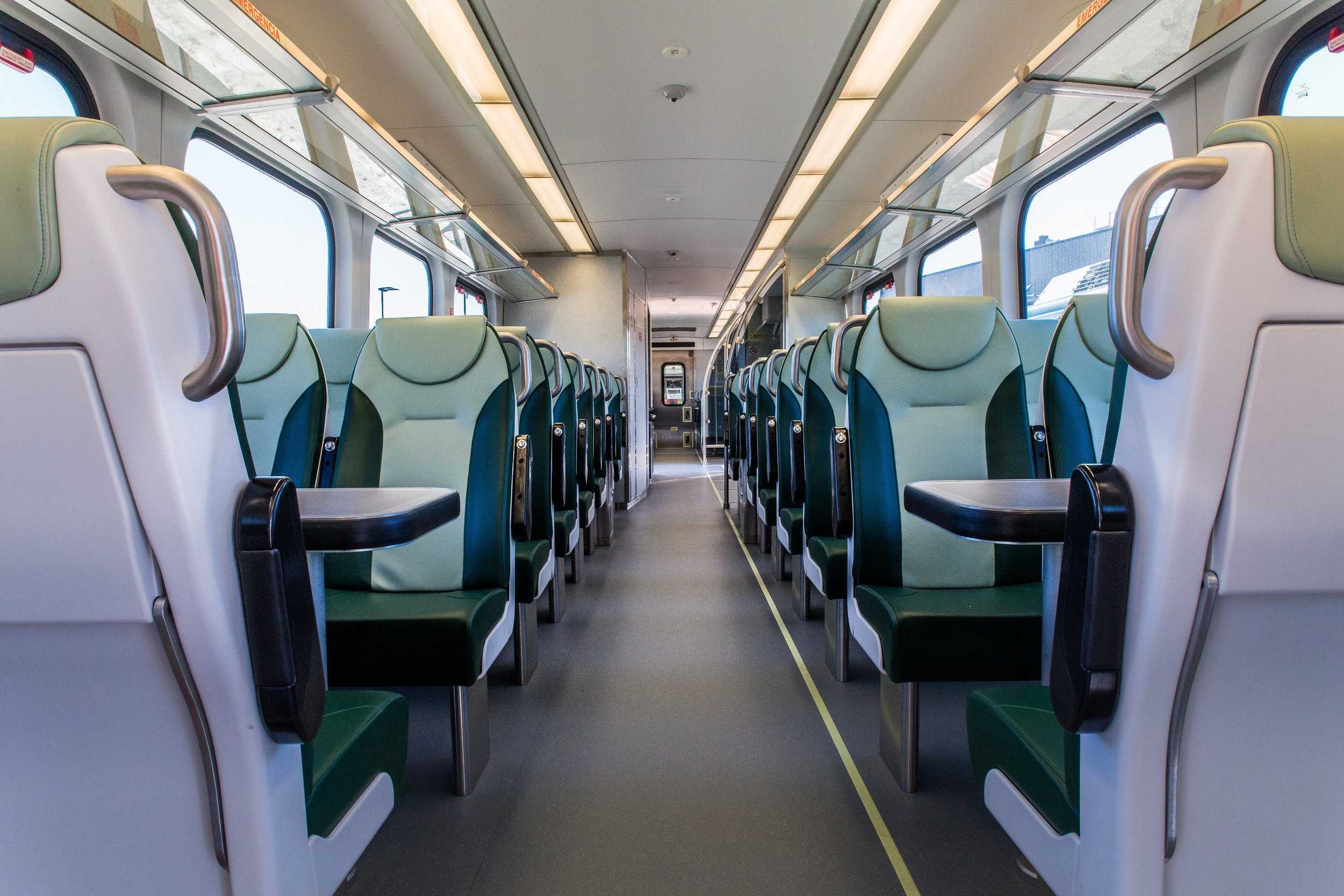As autumn falls upon Rohnert Park, the only sound one might hear while crossing campus is the crunching of leaves under feet — and a train whistle in the distance.
Once the train begins operation sometime in the coming weeks, this will happen every 30 minutes in each direction at the Rohnert Park Sonoma-Marin Area Rail Transit station on Enterprise Drive, according to SMART spokeswoman Jeanne Mariani-Belding.
The Rohnert Park station is one of 10 set to serve travelers along a 43-mile track running through Sonoma and Marin counties according to Mariani-Belding. There is no set date for operation of the trains due to the fact that problems may occur and will need to be fine-tuned before public use.
“Anyone who has had to deal with traffic on Highway 101 understands that we need more transportation options in the North Bay, and SMART provides that safe, reliable option,” Mariani-Belding said.
SMART service will stretch from San Rafael to the Sonoma County airport, with stopsat places like Cotati, downtown Santa Rosa and the Marin Civic Center.
The SMART train route is divided into five zones, each initially set to contain one to three separate stations, according to the SMART Train Fare Fact Sheet. Ordinarily, travel between two zones will cost $3.50, with an additional $2 for each subsequent zone. The SMART website said its transportation will serve the 75 percent of commuters in the North Bay who have to travel between Sonoma and Marin Counties for work, along with providing recreational travel for visitors worldwide.
Mariani-Belding said SMART trains have several benefits, especially for students who prefer to ditch the expense and hassle of owning a car.
“SMART trains offer free Wi-Fi onboard, so you can study, work or connect with friends and family on social media,” said Mariani-Belding. “Our trains also have a beverage car, where you can grab a cup of coffee or something to eat on your commute.”
Though SMART trains still must be tested for travel times, Mariani-Belding said she estimates taking a SMART train would be much quicker than driving on Highway 101.
She used a commute from San Rafael to Petaluma as an example. The trip may take one hour and 20 minutes on 101, but could be as quick as 31 minutes via SMART.
Meanwhile, she estimated a SMART trip from downtown Santa Rosa to Rohnert Park would take merely seven minutes.
Mariani-Belding said she hopes for SMART to start a partnership with Sonoma State University, so students and faculty can take trains for a discounted price.
“We would love to partner with Sonoma State,” said Mariani-Belding. “We think it’s a great fit.”
Passes issued through the proposed Eco Pass program would cost $1,658 per year, which equates to $6.50 per weekday with free weekend rides and unlimited transportation throughout the week.
“SMART’s Eco Pass is a deeply discounted universal pass that would allow students to ride the train for half the cost of standard fares,” said SMART senior administrative analyst Katherine DiPasqua. “The passes would be purchased in bulk through the university and then distributed to students.”
The Eco-passes are only available to be purchased on an annual basis.
Jessica Jordan, a third-year student at Sonoma State, said she likes the idea of using SMART for discounted travel.
“I think it would be beneficial for students and the company. It would allow students to be more mobile between neighboring cities,” said Jordan.
SMART hopes to expand after the service’s debut to the public.
“Students who decide to start using SMART will have even more stops at their disposal after the service’s debut. The overall plan for SMART is a route that will extend to 70 miles total, stopping in Cloverdale up north and in Larkspur down south,” said Mariani-Belding.
“The next step for expansion will be the Larkspur extension, which will help our passengers connect with the ferry to go to San Francisco,” Mariani-Belding said.
Before any of the trains can transport students and other Sonoma County citizens, however, these SMART vehicles must undergo safety testing. Mariani-Belding said SMART is ramping up its system-wide testing for the next few weeks, and urged passersby to be careful when trains approach.
“Always be alert and aware around all railroads crossings; drivers should never stop on the tracks or race through the crossing gates to try to beat a train,” said Mariani-Belding. “And never walk on the railroad tracks —walking on the tracks is dangerous and illegal.”
But Mariani-Belding said she still recommends SMART transit for anyone looking to save commute time.
For more information, students can contact SMART at (707) 794-3330, or visit sonomamarintrain.org.





![[Both photos courtesy of sonoma.edu]
Ming-Ting Mike Lee stepped in as the new SSU president following Sakakis resignation in July 2022](https://sonomastatestar.com/wp-content/uploads/2024/04/CC4520AB-22A7-41B2-9F6F-2A2D5F76A28C-1200x1200.jpeg)



























